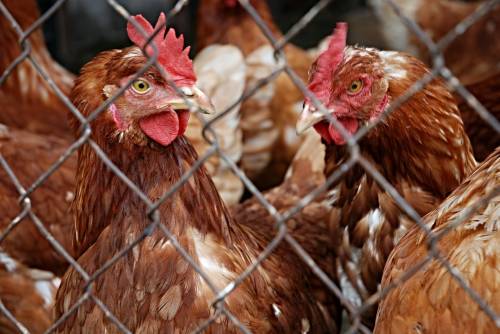 The Resolution ‘On Advocacy Against Factory Farming’ passed at the 2016 General Assembly. The directives and rationale are found here.
The Resolution ‘On Advocacy Against Factory Farming’ passed at the 2016 General Assembly. The directives and rationale are found here.
The concerns fall into three general categories:
- Humane treatment of animals
- Environmental concerns about animal agriculture, including the concerns of ‘fence line’ communities located near factory farms)
- Support for farmworkers and processing plant workers, people of color farmers, and family farmers and ranchers
_________________________________
Informed and effective action depends on a good understanding of the issues. The rationale in the resolution helps with this, along with the resources compiled below.
The inspiration for Monmouth Presbytery to recommend this overture was grounded in concerns about animal production in factory farms. It is important to remember that factory farming is a relatively new phenomenon. Over the past few decades, large-scale, intensive production of livestock and poultry has come to dominate the food system. Factory farming now accounts for almost all animal agriculture in the United States and is valued at over $100 billion per year.
Factory farming continues to grow across the globe, and concentrated animal feeding operations (CAFOs) now account for 72 percent of poultry production, 43 percent of egg production and 55 percent of pork production worldwide. [Information from ‘Can Factory Farm Divestment Work?‘]
The Presbyterian Church (U.S.A.) has a history of affirming that protection of the environment is an essential part of the Christian faith. The 1990 PC(USA) report, ‘Restoring Creation for Ecology and Justice,’ which asserts that humanity and nature are so inextricably bound that the suffering of one affects the other. The report states that,
“human life and well-being depend upon the flourishing of other life and the integrity of life-supporting processes that God has ordained.”
As we seek to be faithful, we do not seek to vilify those who work in good faith in modern industries and we seek the well-being of all through collaboration in creative, positive ways.
Resources
General
- Factory Farming in America — A series of six accessible articles by Traci Hobson
- Environmental Impact, Economic Impact, and Animals from Socially Responsible Agriculture Project
Humane treatment of animals
Farmers of Color, and Family and Contract Farmers
- Under Contract – Trailer, clips and link to documentary on poultry contract farming
- Workers in the industry
‘Fence line’ Community & Environmental Concerns
- Impact on surrounding ‘fence line’ communities
- Livestock’s Long Shadow: Environmental Issues and Options
Action
The National Sustainable Agriculture Coalition provides analysis, policy recommendations, and action alerts on animal agriculture. Explore topics of interest — Antibiotics, CAFOs, Competitive Markets, Contract Agriculture, Meat Label Standards, Sustainable Livestock — and sign up for Action Alerts.
In the news…
Sounding the Alarm on North Carolina’s Poultry Industry
May 2019
North Carolina’s poultry industry has quietly expanded to exceed the size and environmental impacts of hog farming. A recent study from the Environmental Working Group and the Waterkeeper Alliance sheds light on the size and impacts of the poultry industry. This study found that the number of poultry in N.C. has more than tripled since 1997 with the EWG reporting 515.3 million chickens and turkeys in N.C. as of 2018. Will Hendrick, a lawyer for the Waterkeeper Alliance, stresses that the high concentration of phosphorus in poultry “is dangerous for waterways.” Nutrients present in poultry waste such as phosphorus and nitrogen can cause toxic algal blooms and fish kills.
Landmark Effort to Control Factory Farming in Iowa
February 9, 2018
More than 50 groups, including Presbyterian Hunger Program partner, Iowa CCI, are demanding that Iowa lawmakers pass landmark legislation to enact a moratorium on factory farm expansion in a state home to more than 10,000 of them.
As chicken industry booms, Eastern Shore farmers face not-in-my-backyard activism
April 2, 2016, Baltimore Sun
Currently, community engagement happening and there is a plan to work on Maryland State legislation around agricultural run-off and pollution. Learn more from the Assateague Coastal Trust.
Contact php@pcusa.org for more resources and information.